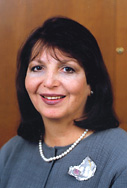
Photo courtesy Huda Akil
Family always has been important to Dr. Huda Akil, but she didn’t think it would affect her research as co-director of the Molecular and Behavioral Neuroscience Institute until she spent the day at a park with her granddaughter, Sophie.
Akil, a Distinguished University Professor and Quarton Professor of Neurosciences in the Department of Psychiatry at the Medical School, found her latest research inspiration at a park in New York City. Then 2 years old, Sophie begged her grandmother to play in the sand with her, and despite Akil’s fatigue and inappropriate attire, she was persuaded to play. Grandmother and granddaughter spent the evening making sandcastles and burying themselves in sand.
“It made her happy, and it made me happy, I realized. And then I had an odd thought — where is ‘happy’ in my brain?” Akil says.
Three years later, Akil and her husband, Dr. Stanley Watson,co-director at the MBNI, still are interested in studying the brain biology of happiness. “I, along with my colleagues in affective neuroscience, know so little about the neurobiology of positive emotions, and I want to understand more.”
Ask Dr. Huda Akil
What moment in the classroom or lab stands out as the most memorable?
In the classroom, it’s whenever a student not only gets the point, but asks a question in a way that I’ve never thought of. And in the lab, it’s when you are proven wrong but in an interesting way. You think you understand something, and if it comes out exactly the way you expected, it’s nice, but if it doesn’t work because there’s something else that makes you rethink the premise, that’s when you make progress.
What can’t you live without?
As a human being, affection and love. As a scientist, reading and thinking.
What is your favorite spot on campus?
The Law School. I like the way it’s a contrast with all that’s new on campus.
What inspires you?
A combination of ideas and observations.
What are you currently reading?
Nate Silver’s “The Signal and the Noise — Why So Many Predictions Fail but Some Don’t.”
Who had the greatest influence on your career path?
My father, who encouraged curiosity and not taking shortcuts.
Akil’s research also focuses on the biology of addiction, depression and stress, but she says that doesn’t directly relate to her studies on happiness.
“I don’t feel that being joyful or happy is simply the lack of feeling bad or depressed. It’s an active, positive process. We’re not saying happy people have no stresses, just that they feel the positive outweighs the negative.”
Akil considers her research very timely.
“Life today is more stressful. We’re not running from bears or searching for shelter, but there is so much pressure and demands on people, and depression is a big source of suffering for humanity,” she says. “To me, studying depression and happiness is both intellectually fascinating and really important for a humane point of view.”
Growing up in Damascus, Syria, Akil’s father, a psychologist, supported her studies. “If I asked, ‘How do seedless grapes grow without seeds?’ or something he didn’t know, he would go and research it and tell me.”
Nowadays, it’s members of the next generation that inspire Akil. She says they remind her about what is important in life, as they look with fresh eyes at the world around them.
The weekly Spotlight features faculty and staff members at the university. To nominate a candidate, please contact the Record staff at [email protected].

